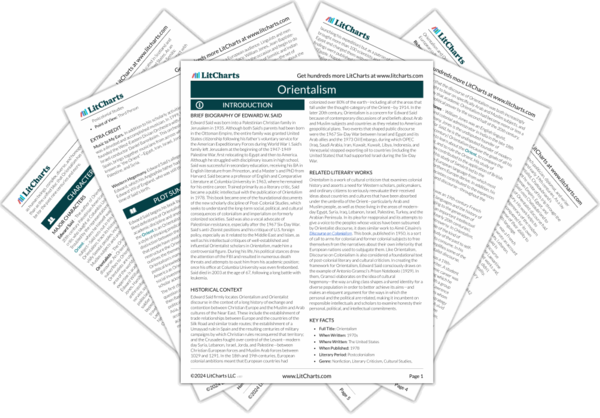Welcome to the LitCharts study guide on Edward W. Said's Orientalism. Created by the original team behind SparkNotes, LitCharts are the world's best literature guides.
Orientalism: Introduction
Orientalism: Plot Summary
Orientalism: Detailed Summary & Analysis
Orientalism: Themes
Orientalism: Quotes
Orientalism: Characters
Orientalism: Terms
Orientalism: Symbols
Orientalism: Theme Wheel
Brief Biography of Edward W. Said

Historical Context of Orientalism
Other Books Related to Orientalism
Key Facts about Orientalism
- Full Title: Orientalism
- When Written: 1970s
- Where Written: The United States
- When Published: 1978
- Literary Period: Postcolonialism
- Genre: Nonfiction, Literary Criticism, Cultural Studies, Postcolonial Studies
- Point of View: Third Person
Extra Credit for Orientalism
Music to My Ears. In addition to his scholarly activities, Said was a devoted and accomplished musician. In 1999, he co-founded the West-Eastern Divian Orchestra with Argentine Israeli conductor Daniel Barenboim. This orchestra, based in Spain, brings together musicians from across what was once known as “the Orient”—Egypt, Iran, Israel, Jordan, Lebanon, Palestine, and Syria.
Western Hegemony. Edward Said’s allegedly disliked his name, Edward, which his Anglophile father had selected in honor of Edward VIII of England, who was still the Prince of Wales at the time of Said’s birth.







